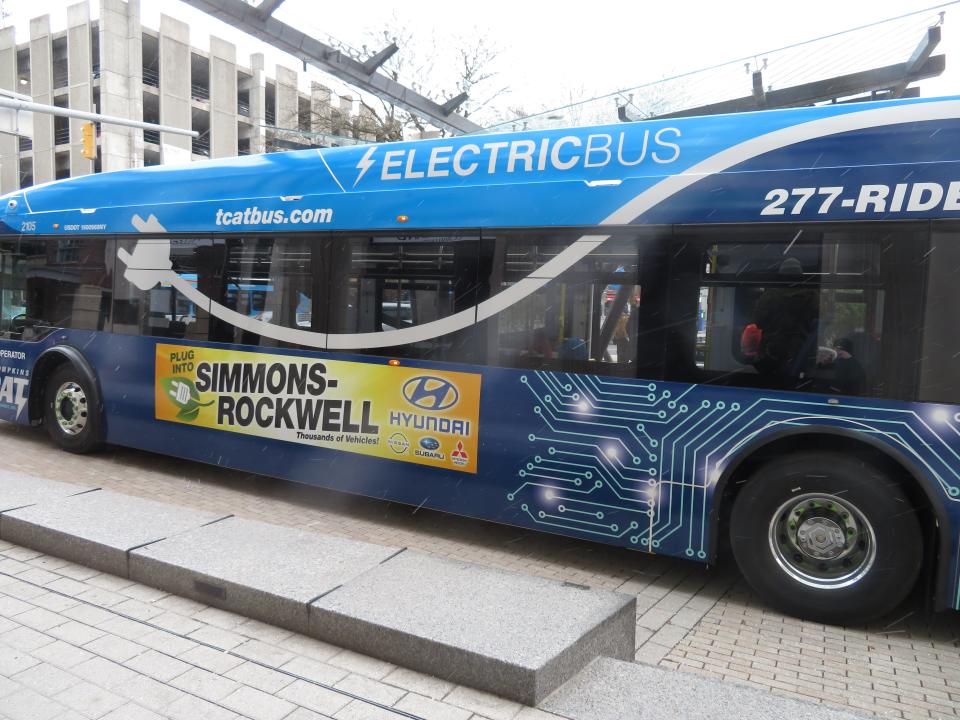TCAT to purchase 5 new diesel buses after underperformance of electric fleet. What to know
Tompkins Consolidated Area Transit (TCAT) has announced plans to acquire five new diesel buses, a purchase that would contradict the transit operator’s goal of having an “emissions-free” bus fleet by 2035.
TCAT officials have stated that the new acquisitions will enhance service and reliability for riders as the organization grapples with continued staffing shortages, untimely repairs, fleet of buses starting to show their age, leading to the transit services it provides declining sharply since the first lockdowns of the Coronavirus pandemic.
TCAT’s electric buses, unveiled on Earth Day in 2021, have underperformed during periods of winter weather, according to an April 3 statement from the organization. They have also become difficult to repair, which adds to the mounting challenges in front of the agency.

On March 13, TCAT Acting General Manager Matthew Rosenbloom-Jones removed the Proterra buses from service after mechanics discovered that the frame on one of them separated from its axle while it was positioned on a lift, rendering the bus unfit for service, officials said.
California-based manufacturer Proterra declared bankruptcy in August 2023, leaving the company unable to offer official maintenance support as it merged into Phoenix Motor.
“We will not return any of these buses to service unless we are absolutely satisfied all of them are safe to operate,” Rosenbloom-Jones said in statement from TCAT.
The TCAT Board of Directors will convene in a special meeting on Friday, April 12, to consider purchasing five diesel replacement buses while the agency mulls the fate of its electric buses, which have sat idle in TCAT’s garage the past for three weeks
TCAT’s Board of Directors have discussed plans to purchase five 40-foot diesel buses from bus manufacturer Gillig for approximately $2.5 million. The purchase will be covered by state funds earmarked for TCAT and replace five diesel buses that are about 12 years old.
What about an emission-free fleet?
Despite the organization vying for new diesel buses, it won’t abandon its plan to create an emissions-free fleet, but will be moving its goal date beyond the 2035 benchmark set by the company in prior years, officials said.
“All new publicly funded full-sized transit buses have a useful life of 12 years. This means TCAT can’t seek government money to replace the new diesels until at least 2036,” the organization said.
TCAT is still on track to purchase another seven electric buses through the federal Low-No Grant Program, which aims to reduce greenhouse gas emissions nationwide, which it now plans to purchase from Gillig, expecting them in TCA possession by the summer of 2026.
“I think having a diversified fleet really makes sense,” TCAT Board Member Shawna Black said in a statement. “We had great hopes for the electric buses but unfortunately with the pandemic, the shortage of supplies, maintenance issues and the bankruptcy of Proterra, it has been a perfect storm. This is not to say that five or three years from now it won’t be a different story, but right now we need to invest in something that is tried and true and that is going back to diesel buses.”
TCAT has purchased a number of diesel and hybrid buses from Gillig in the past, and TCAT’s maintenance staff have a great relationship with Gillig technicians and are already familiar with the manufacturer’s engineering and design, according to Rosenbloom-Jones.
TCAT representatives have been in contact with Phoenix Motor, state regulators and with peer transit agencies that have likewise encountered problems with their Proterra buses, to determine what steps to take since removing Proterra buses from service.
TCAT has not yet made a final determination about when any of the Proterra buses will return to service, and said that all TCAT buses are regularly inspected and must pass muster with the New York State Department of Transportation before they are allowed to serve riders.
This article originally appeared on Ithaca Journal: Ithaca TCAT electric bus failures lead to purchase of new diesels

